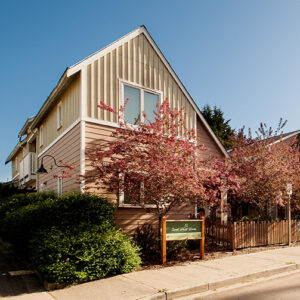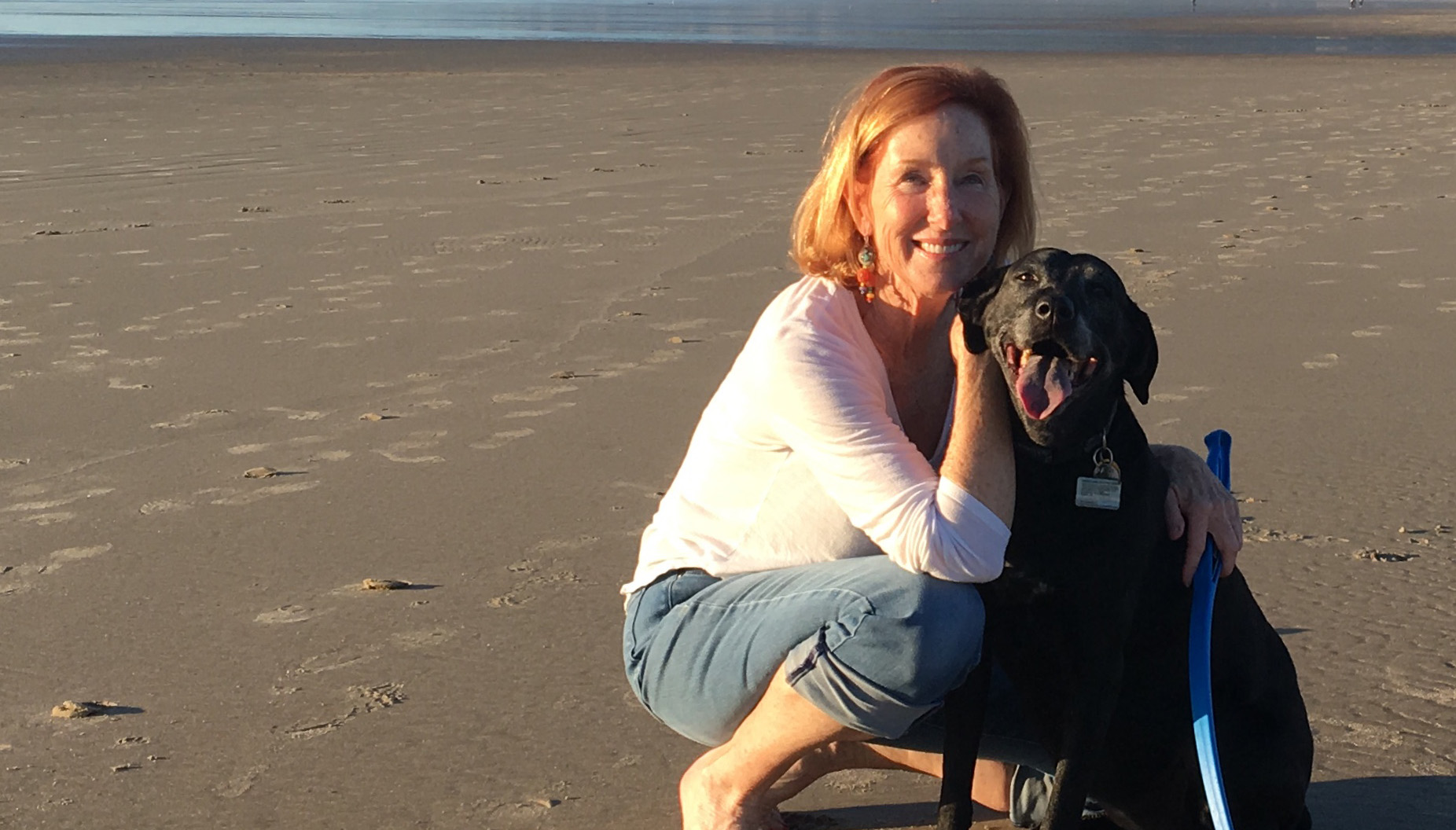HRB’s Janet West was a refuge for Mary Anne DeLapp after a fire destroyed her home. She loved it and yet she left. After eight months and with newfound stability, she chose to free it up for someone who needed it more—perhaps a woman living on her own just like her.
In February 2022, Mary Anne DeLapp came to HRB after a house fire. She had been walking a neighbor’s dog and returned to find her cabin so black with smoke that she couldn’t see two inches in front of her face. An ember from the fireplace, the home’s primary heat source, had fallen on the rug, smoldered, and set fire to a paper bag nearby. “I thank god continuously no one was hurt,” she says. The house had only one door. Had she been asleep in the bedroom, she might not have made it out.
 An acquaintance, a former facilities manager at HRB and one of the many people who came to her aid, referred Mary Anne to HRB. Her income qualified her for housing, the fire placed her at the top of the list, and thanks to exceptional luck, an appropriate unit became available. Mary Anne moved into HRB’s Janet West and stayed for eight months.
An acquaintance, a former facilities manager at HRB and one of the many people who came to her aid, referred Mary Anne to HRB. Her income qualified her for housing, the fire placed her at the top of the list, and thanks to exceptional luck, an appropriate unit became available. Mary Anne moved into HRB’s Janet West and stayed for eight months.
“I was overwhelmed with the love of the community, friends, and clients, and my landlady. It brought me to tears. A dear friend of mine, Janelle, put something on social media and drove all around the county picking up bags off people’s porches. So I had clothes. Some of the people I dog sit for gave me furniture and dishes… I feel like I was blessed and very well cared for with love by friends and clients—and strangers.”
Mary Anne has lived in homes all over the world. The first at Camp Pendleton in California, where she lived for 14 years and where her father served in the Marines. The next, a 120-year-old farmhouse on 20 acres in Poulsbo, where the family kept pigs, cows, chickens, and a small herd of disobedient goats. After high school and anxious to experience the world beyond, she left to work as a bank teller in San Diego, where she met and married her husband of 24 years, a U.S. Navy fighter pilot. Together, she as a stay-at-home mother, they lived in Japan, Norway, and towns across the U.S.
Many other homes followed. They tell the story of a peripatetic and unpredictable life, one marked as much by daring and independence as compassion and gratitude. A rented room in small-town Illinois when Mary Anne, newly divorced, went back to school, earning a bachelor’s from Principia College at the age of 47. A tent in Iraq when in 2004, unfulfilled by corporate work and burdened by $80,000 in student loans, she joined her younger son, a former Force Reconnaissance Marine, to work for a company in Iraq. After a year and half spent detonating munitions, Mary Anne had paid off her loans and saved for a down payment on a house in Suquamish.
Too many homes to list here, but the one with perhaps the most to tell is the Suquamish single-family with a large backyard, a white picket fence, and a profusion of flowers. Mary Anne bought it by and for herself with hard work—then lost it out of the goodness of her heart. While working in external affairs at a university in Colorado near her son, she rented it out to a single mother with a teenage son. The son developed cancer, and in caring for him, the mother lost her job and could not pay rent. When no other living arrangements could be found, Mary Anne decided to let her stay and pay what she could. It was not enough to cover the mortgage or her Colorado rent, and Mary Anne lost the home in 2008. “I have two sons, and when I found out what she was going through, I could relate, I could empathize, and it was more important to me than the house.”
Mary Anne has moved nine times in the last seven years. Limited income from social security and dog walking has meant a series of homes, each with a problem of its own, like the log cabin without potable water. In this context, Janet West was a dream. “I hadn’t rented a place that nice, not that I wasn’t happy in the other places, because I was. But this place didn’t need to be heated by a fire. It had a nice refrigerator. It had a bathtub! All the little conveniences I had always taken for granted… I just felt like I was in heaven.”
Still, Mary Anne decided to leave. She wanted to expand her dog walking business, which would place her over income, and was able to find other living arrangements. A part of her was happy to know that the beloved home would go to someone facing circumstances as urgent as those that brought her to HRB. Mary Anne’s story is uniquely hers, but there are a disproportionate number of single mothers and divorced women living in HRB homes and on the waitlist, many with metaphorical house fires of their own. Data around divorce show large and lasting gender differences, with women experiencing a greater income loss than men due to multiple and compounding factors. Women are more likely to work lower-paying jobs, take on the responsibilities of raising children, and face more limited housing options (75% of households in public housing are headed by women). HRB data bears this out. Of the 153 households on our waitlist, 36 are senior women without a spouse or live-in partner, and 41 are single mothers with 64 children among them.
“I put myself in someone else’s shoes,” Mary Anne says about her decision to leave, “because I was in those shoes. I had no place to go.”
Mary Anne read this story. It felt true and right. But lest you be left with too strong a pang on her behalf, she asked to share a parting thought. “At 73 years of age, the strongest lesson I have learned thus far through life’s unexpected challenges and changes is that I am not a victim, and that even amidst the temptation to fear life’s uncertainty, waking up to a sense of ‘gratitude’ for each little daily expression of goodness is the most powerful healer that inspires hope and healing and true happiness.”
